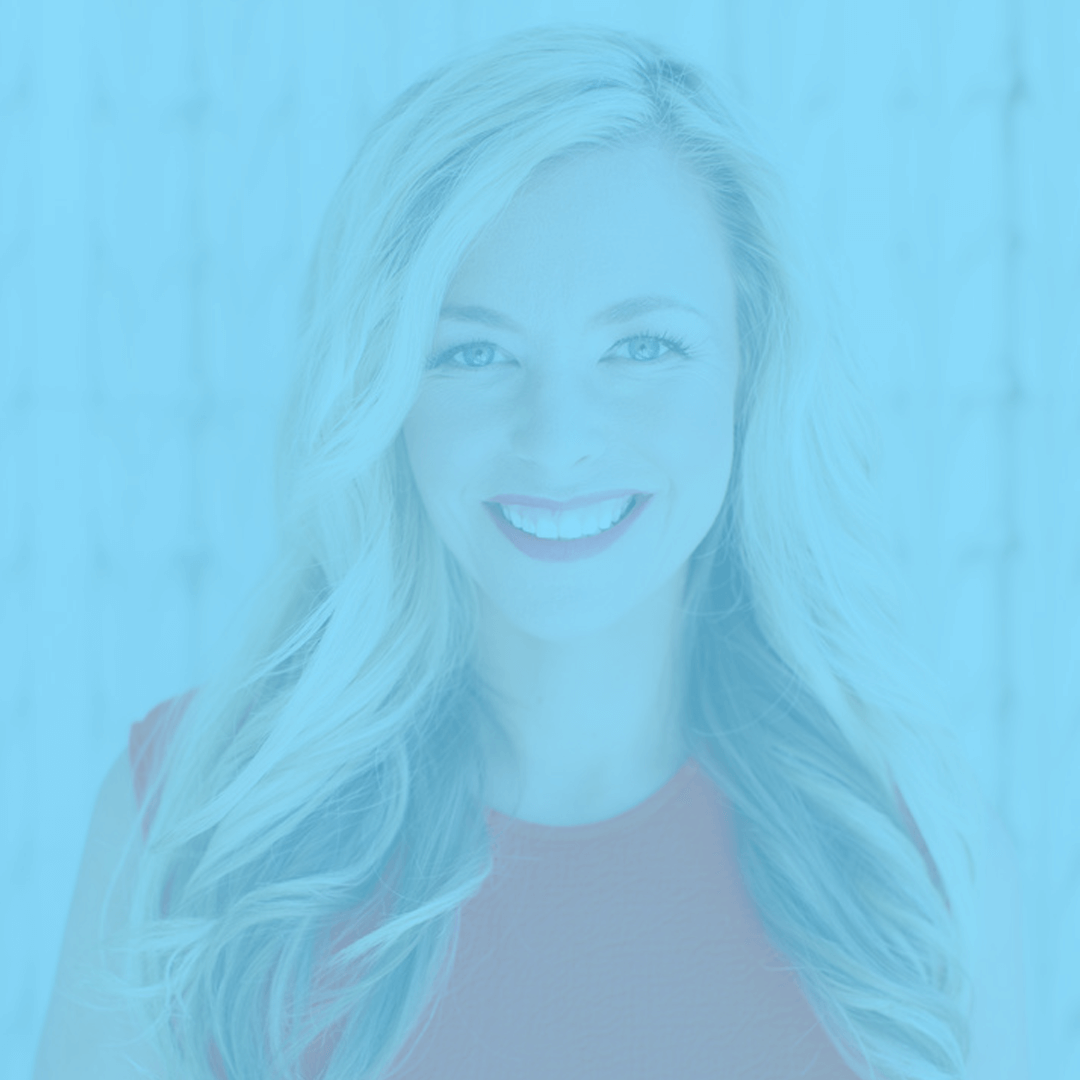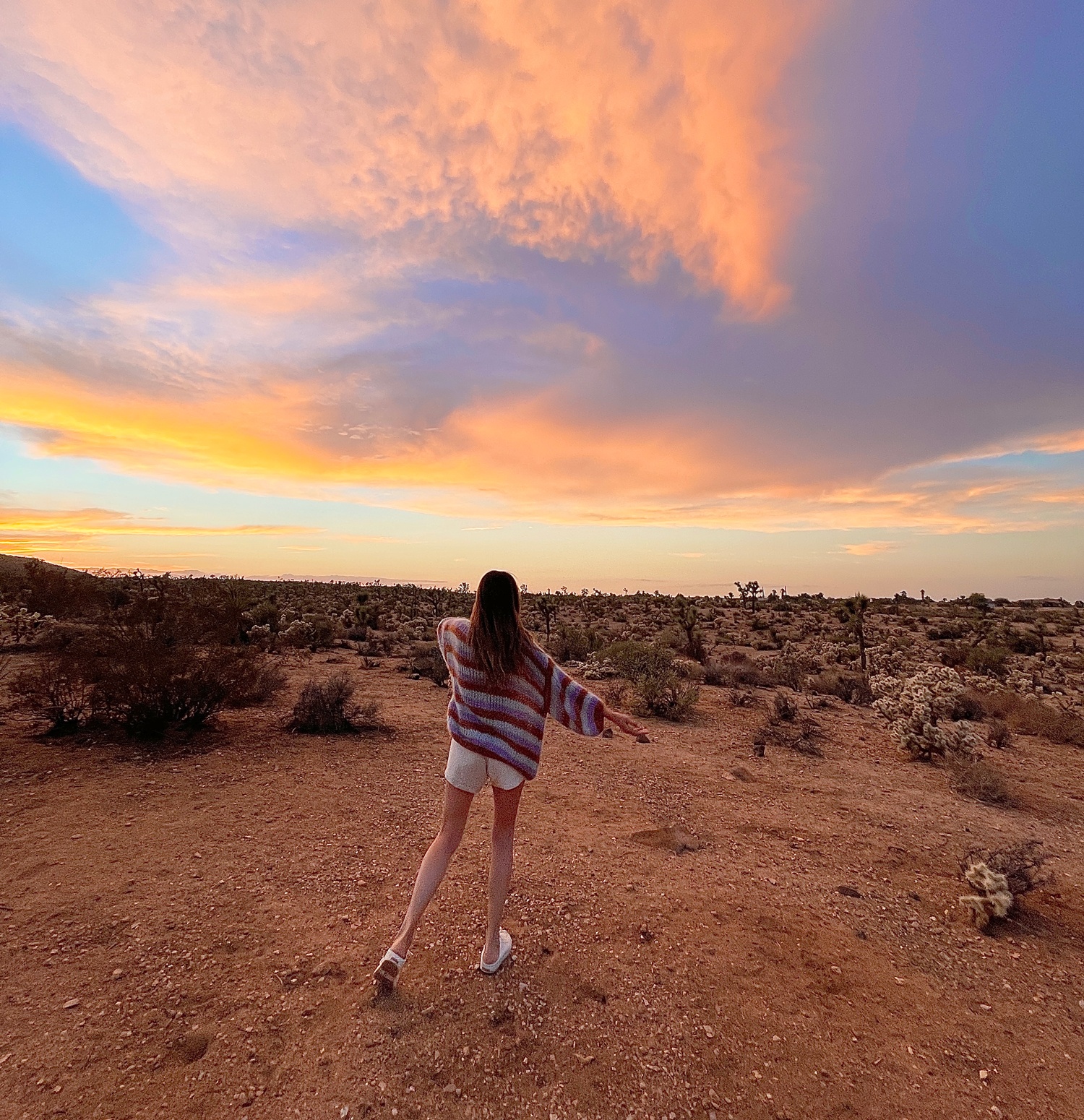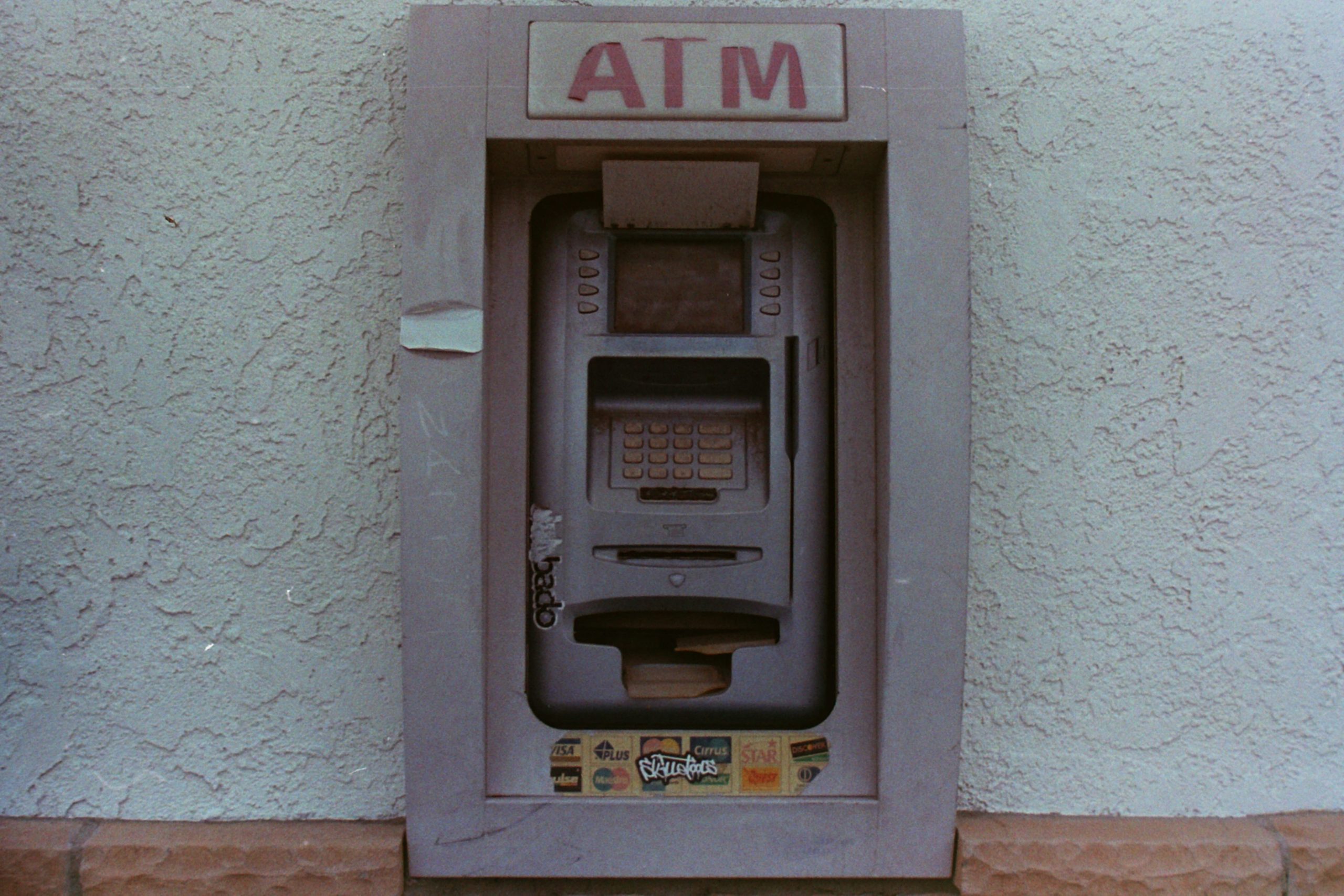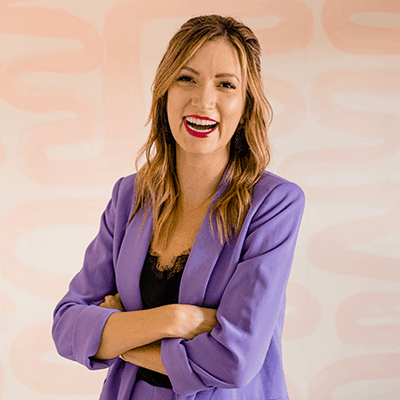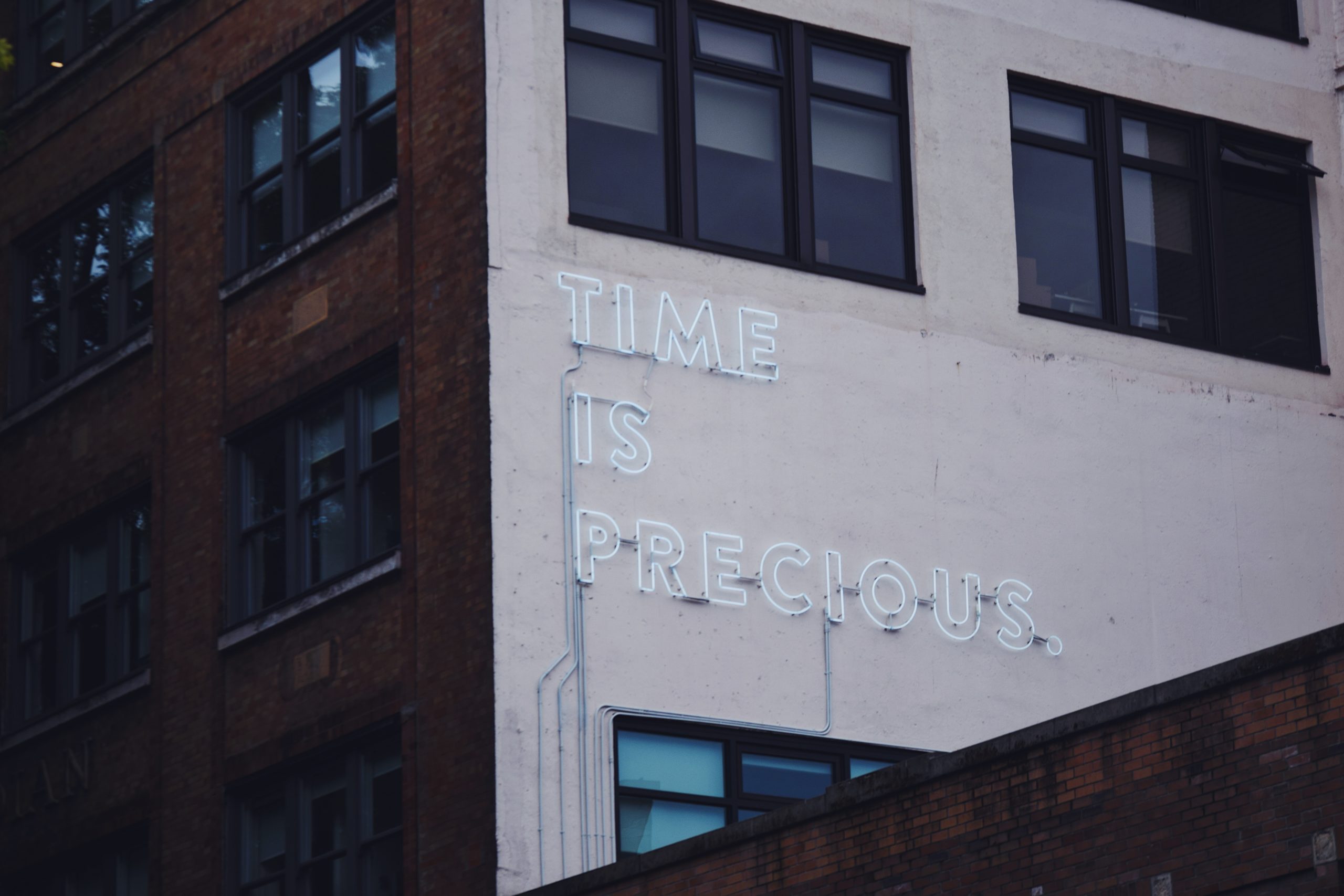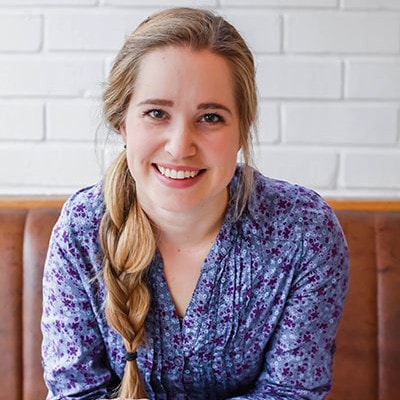Sarah Kaler has an amazing story to share, and I’m super excited for you to hear it. For an entire decade, Sarah took the reigns as a badass senior director at Lululemon, helping grow the popular athletic apparel brand from a small company with a few stores into a massive, multi-million dollar empire.
And while it all sounds awesome on paper, Sarah, who loved to work and was constantly flying around the world, suffered serious stress-related issues during the escalation, which led to her changing the way she now works and lives. Today, Sarah shines as an entrepreneur and business coach, empowering women to own their own power and become world-class leaders.
If you want to become a stronger leader while maintaining a better health and work-life balance, this episode is for you. Sarah’s story is one that really inspires me deeply to become a better leader myself and to live with more purpose (and to think bigger than I already am).
Let’s get into it.
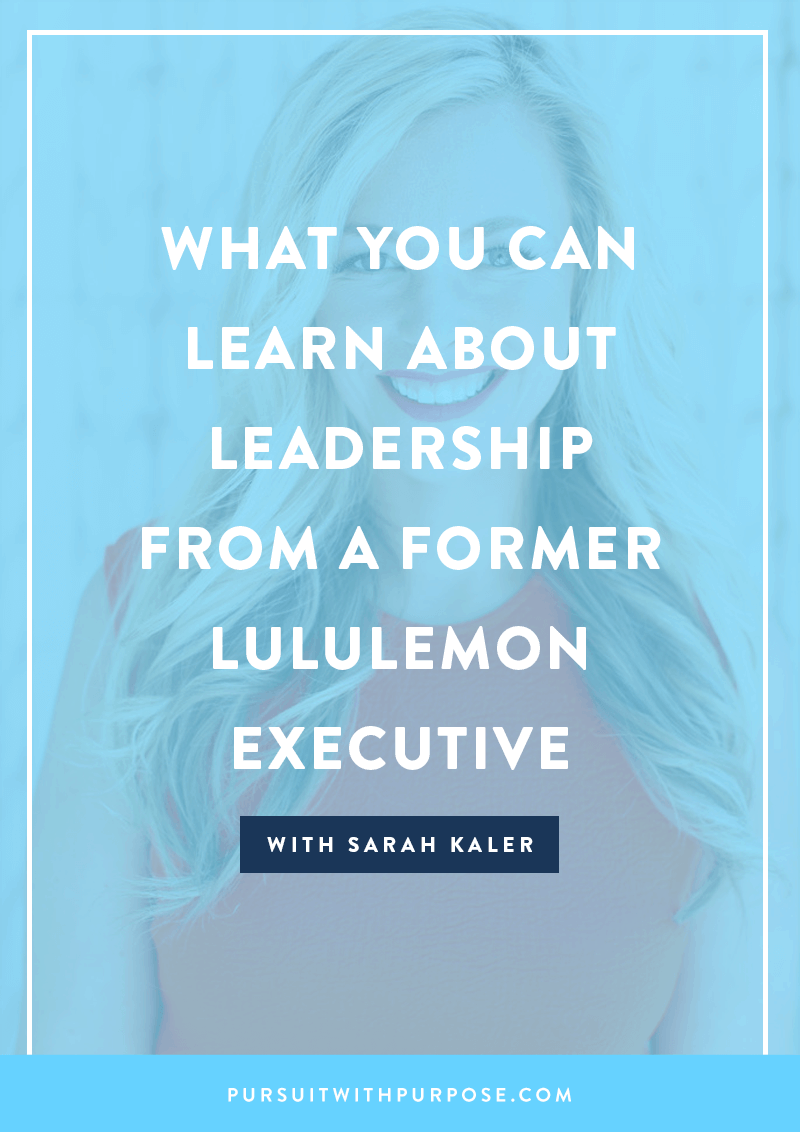
Check out the episode below:
In this episode, you’ll hear about things like…
- Sarah’s thoughts on the role of leadership as it applies to all sizes of organizations, big or small.
- What Sarah does in her daily life that allows her to optimize her health and life in general.
- The definition of an “indestructible leader” (and the sure ways that you can start to become one!)
- How Sarah effortlessly makes decisions and sets her priorities.
- All the nitty-gritty details of Sarah’s “rock bottom” moment, and how it led her to what she does now.
Some Questions I ask Sarah…
- How can we, as entrepreneurs, balance our quest for constant growth with peace and health?
- What are some things that entrepreneurs can learn from how Lululemon runs their company?
- What do you do in your business now to prevent things like burnout and stress?
Links from the interview:
- SoulPowered
- SoulPowered Research Institute
- Sarah on Facebook
- Sarah on Instagram
- Sarah on Twitter
- TED Talk: Brene Brown on Vulnerability
What do you think?
I’d love to hear your thoughts on this episode. How can you step into your role more fully and become a better leader?
Here’s how to subscribe + review
Want to be the first to know when new episodes are released? Click here to subscribe in iTunes!
Also, podcast reviews are pretty darn important to iTunes and the more reviews we receive, the more likely we’ll be able to get this podcast and message in front of more people (something about iTunes algorithms?). I’d be extremely grateful if you left a review right here letting me know your favorite part of this episode.
#PursuitWithPurpose
Loving the podcast? I encourage you to use the hashtag #PursuitWithPurpose to show our PWP tribe how you live your purpose everyday. Plus, you’ll get to sift through the hashtag to find other business owners who care about community and connectedness over competition and comparison. And I’ll be reposting some of my favorite images and stories, too. 🙂
Thank you for listening!
Transcript
Read the Interview Transcription HereHey, Pursuit with Purpose tribe, super excited today to welcome my friend, Sarah Kaler to the podcast. Now Sarah has a really interesting story, as you’ll learn about more in today’s episode, because for a decade she was a senior director at Lululemon, helping it grow from this small company with a few stores to a massive multimillion dollar empire. During this quick escalation to success in this company, Sarah suffered stress related seizure episodes and a diagnosis of epilepsy, which led her to change the way that she works and lives. This is coming from a very hustle minded woman who loved to work, was constantly flying around the world and didn’t know how to stop, but had to. Eventually, she decided to strike out on her own as an entrepreneur, and now she coaches women on how they can own their own power and become world class leaders.
In fact, in this interview, we talk about a landmark research study her company is doing to learn more about how some women become indestructible leaders and what we can learn from them. Now this interview is packed with important ideas that are helpful for anyone, man or woman alike, who wants to become a stronger leader, have better health and work life balance, and create a truly indestructible business and life. Now Sarah’s story is one that really inspires me deeply to become a better leader myself and to live with more purpose and to think bigger than I already am. I am so excited to introduce you to her.
Melyssa Griffin: Hey, Sarah. Welcome to the show.
Sarah Kaler: Thank you. It’s so wonderful to be here.
Melyssa Griffin: Super excited chat with you. So I know that before you started your businesses that you’ve got right now, you had a really high powered corporate career. Can you tell us a little bit more about that experience?
Sarah Kaler: Yeah, definitely. So I actually—I did have a high powered career. A lot of people don’t know this about me, but I actually was an entrepreneur before having a big corporate career. So I like to say I am—I feel like I am a serial entrepreneur, in that, I went into my career with an entrepreneurial, not only mindset, but sort of just in my body. I was just built that way. So I did go into a very fast paced, high growth career with that mindset right, sort of what some people now deem that term, sort of the intrapreneur. That was definitely me. I definitely ran my corporate roles as if I was an entrepreneur. Luckily for me, I had opportunity to do so also. But yes, I was recruited out of my own business actually by Lululemon Athletica when they were very young. They were pretty much solely a Canadian company for those of you listening, who may or may not know that they’re based in Vancouver, British Columbia, and I live in Seattle, Washington. So I was just over the border, sort of a skin and a jump where the brand had a lot of brand awareness already. If we kind of go back to that time, it was the late 90s, early 2000s when the yoga industry wasn’t what it is now where it’s everywhere and it’s like oozing out of every building and business. It wasn’t like that then. The yoga community was much smaller. There wasn’t a studio on every block. And so, they were looking to come to the United States. I was approached to help them do that and start in the Seattle market.
They had, at the time, they had some wholesale accounts and like literally two stores in Southern California. That was it. I had built a relationship with them because – this is how they knew me – I was a yoga studio owner. It was my first business. I started to—I actually approached them in years prior, and became one of their first wholesalers in the United States. I had built this huge business, retail business that I didn’t even know I was really getting into. I knew I wanted to find some incredible gear for women and that really helped women move and live in their bodies, that was really fit* for a woman’s body. And then it took off. Before I knew it, I had this really successful retail business in addition to my yoga classes and my team running that studio. So Lululemon approached me to come on board and I thought no way, I’m self-employed. I have no intention to ever work for anyone else. In fact, I had plans to open multiple studios all over Greater Seattle and I had this whole vision. My husband at the time said, “Wait a minute. I think you should consider this.” It took me several conversations and a lot of deep thought, but I made the leap and…
Melyssa Griffin: What were your deciding factors in doing that? Why did you just…?
Sarah Kaler: Oh, that’s a great question. Well the thing that got me was, it was a small company at the time and they had had a ton of growth in Canada. That was really cool and interesting to me, because how they grew—and of course I had done—I did my research. I was interviewing them just as much as they were interviewing me. I had had this relationship with them already that was really unique because I was doing business with them already. And so it wasn’t like I was in a typical interview where you’re looking for a job. I wasn’t looking for a job. I had this opportunity to really explore the conversation in a different way. For me, what I found was that they were really engaging community in a way I had not seen, and it was extremely entrepreneurial. There was no advertising, zero, zero advertising. It was human to human connection. They’re building relationships with a community, with athletes, instructors, students, practitioners, and getting to know people and serving people. It was just fascinating to me. The whole business model was built on that. I thought, I already do this, there’s something to this, and it’s spreading like wildfire in this country. I kept thinking what is going on here. There is something really fascinating.
The other thing that really was interesting is there was this culture of being an entrepreneur, even though it was a company. I think at the time there was about 40 people in the head office when I eventually said yes. So that’s small compared to now, where the company is I think slated to hit about four billion by about 2020. I mean don’t quote me on that, but it’s a huge international public company now. So a lot has changed. It’s interesting because then, it felt so palpable, and the culture felt so progressive, and people mattered in a way that I hadn’t seen before. That was interesting to me. So I talked to a lot of different people. I thought well this seems like a group of entrepreneurs who are really committed to a big vision and doing something really big and really progressive in the world. That’s interesting to me, because I already thought about way. I already operated that way. I thought, well I haven’t been a part of a collective of entrepreneurs who are all committed together to making a big impact. So I thought hey, well, after enough processing and learning, I thought, well I can try this for a year. I mean I can do anything for a year, and it ended up being 10 and a wild ride.
Melyssa Griffin: Yeah, it sounds like it. So what are some things that you feel like entrepreneurs could learn from the way that Lululemon runs their company or even started their company from what you see?
Sarah Kaler: This is a great question. I don’t think anyone’s ever asked me this question. I had so many interviews. This is actually really important because so many people have actually brought me into their company saying, “We want to understand that culture that they built there. Why was it so successful?” Especially in those original years where it was such a high growth successful company. What was that sort of secret sauce? One of the most important elements was ownership and giving your people ownership. So there’s one thing about everyone being committed to the vision. So you got to be clear in your vision, your mission, your values. We hear that as entrepreneurs. It might seem like a no brainer, but you have a job as founder, as CEO, and even as a leader on a team, even if you’re not the founder, but perhaps you’re a manager or you even have significant responsibility within a team. You have the responsibility to continuously communicate the messaging, the core messaging of your vision and mission every single day. This is the thing that gets missed because there is such a focus on the strategy, the tactics, the to-do’s of the daily operations of the business, that everyone gets lost in it. It’s like, “Oh, what are we doing today? What are we executing? What are we implementing?” But while we are getting work done, we have to think about how do we get work done here. That’s what culture is. Culture is how we get work done. It’s the way of being.
And so our job as leaders, regardless of our title, is to express that in everything that we do, both in a formal way—so formal being, hey we’re in a team meeting, let’s talk about it, let’s reinforce it, let’s remind people of it literally every day, every week. Informal ways, when we’re in casual conversation, when we’re reminding someone of how we want to do something, or when we’re asking them for their opinion, or giving them casual feedback. Even sort of that kind of concept of a water cooler talk, where you’re just kind of—it’s like texting or messaging in your project management system. It’s like you’re just hanging out. It’s like you’re still reinforcing culture in those moments and ownership to bring it full circle, is something that Lululemon did to a degree that I—because now I’ve worked in 50, 70 companies and I’ve seen so many cultures. Lululemon did this to a degree where they said this is your team, this is your store, this is your function department, you own it, run it as if it’s your business, your money, you own the decisions. Instead of asking for permission, ask for forgiveness.
Melyssa Griffin: I love that. That is so empowering too. I actually—I took my team—it wasn’t even a year ago, we went on a team retreat. We had a little piece of the retreat where we were talking about vision and what our goals were for the next year for the company. I realized that I had never fully shared my vision with my team, and a lot of them said like, “Wow, this is so exciting. I didn’t even know that you had this long term vision or mission of this company.” It was totally an aha moment of wow, I’ve been telling them exactly what you’re saying; the implementation, the strategy and forgetting the whole purpose behind why we’re doing what we’re doing. What are some maybe tactical examples of how you saw that play out, maybe in a team meeting or just in how leaders or people who worked at Lululemon carried themselves with that mission, ownership?
Sarah Kaler: Well I think this goes to every individual. I think every individual person does this differently and in their own unique way, because we’re all different as leaders and we’d be silly to think—and I think there’s a part where we get it mixed up in this whole leadership conversation, is when we think we’re in a box, everybody into a category, or we’re going to give everybody—I mean as great as personality assessments can be, we tend to bucket people and leave it there. This is what—we want to recognize that people are individual human beings with unique sets of strengths and skills and this life experience. So everyone brings something different to the table. So with that, your version of how you live and breathe culture, and even how you execute on that, is going to be different. We also all grew up with a different background. So how we’ve learned to communicate is different and we’ve got to recognize that. So in a meeting, one person might say very explicitly, “Let’s talk about how we have this initiative that we need to execute this quarter and who we want to be as individuals while we are executing this initiative.” Who are we committed to being as individuals while we get this work done? That might be someone’s expression of that. Somebody else might use a completely different language, but in essence, they might get to the same end result.
So everyone’s going to get to the same end result, potentially, in a completely different way. If they’re committed to a living, breathing culture, and owning that, that’s what really matters. So somebody else might say, “We have this initiative this quarter. How do each of you really feel about leading through our values? How do you do that every day in your work? Or what resonates with you about…?” You could even say—you could break it down and say within your strengths, who feels most strong and energized to work on which part of this initiative. As a team, let’s look at that. That might actually, because people are working within their strengths, they’re energized, they start taking that ownership. So naturally through that active dialogue in a meeting, culture naturally comes alive without even referencing it. So there’s so many different ways to get there. It’s about mentally, as the leader saying, “I have the intention of during this meeting, I’m going to accomplish X.” Maybe you have a plan A, plan B during that meeting if plan A doesn’t work, or maybe you go to communicate plan A and it’s just—you look at your people and it’s just not really working.
So there’s lots of different ways. I think what’s important is that as entrepreneurs, as leaders, that we know we’re responsible ultimately for the outcomes and for this constant messaging of what our culture is, what matters, because at the end of the day, we turn around and say well why didn’t something happen, or why did the ball drop, or why aren’t they getting it. How many times do we hear that from leaders? Why do I have to tell someone something 100 times? Those sorts of typical quotes we hear from people with their teams. This happens in all environments. It’s really up to us to be constantly responsible and consistently in action for our team members.
Melyssa Griffin: That’s so interesting. It’s really good advice about taking ownership and breathing that culture with your team. So you were in Lululemon, you were helping to grow it, you were there for 10 years doing this incredible career. What eventually led you to quitting your job there?
Sarah Kaler: Well, a couple different things. So somewhere in the mid 2000s, I was promoted—I was growing and promoting quite quickly. I was on the senior leadership team. I was running majority of the United States in one of my roles. It was incredible. We were opening 30 to 50 stores per year in the United States. It was high, fast growth. We had gone public early on when I joined. And so there was a lot happening. If you’d interviewed me back then, I would have told you I love my life. I’m on an airplane all the time, I’m developing teams, leaders. I am opening stores in new markets. It was a 300 million dollar business that I was running, just my part of it, not the whole company. And so it was incredible. I mean I feel like I got my real life MBA. Behind the scenes, what was happening for me is my health started to deteriorate. I was struggling with it because I had been an athlete my whole life, I had been a yogi. I had never had health problems and I was really in denial about it. I started to have grand mal seizures. I actually had a diagnosis of epilepsy and here I was in my mid 20s. I was successful, young. I was in these big roles, young. I didn’t have any way to identify with what was going on. The business I was in never sleeps. And so for me, I was in this place of I am now relating to an executive team and my whole world, my whole life as I’ve built. Now I have a team of specialists and doctors telling me you are risking your life, these episodes are happening, you have to slow down, you have to stop.
At the time when it first started happening, I did not have tools in my toolkit so to speak, for coping or processing. I had an incredible family and husband, who are, I mean so scared, I mean as you can imagine. But me personally, I was a typical overachiever driver. I was so good at getting results that the two things were so—there was—it was so incoherent in my mind that I just could not make sense of it, which sounds crazy now in retrospect because my life has changed so much, but then I did not know myself as a leader any other way. And so anyone listening who’s had any kind of experience like this, or even to a small degree experienced a period of burnout or exhaustion, or know someone close to them who has, will know what I’m talking about because there’s this—a sort of build where the calling got louder. The episodes got more severe. They came with serious injuries that I had to rehab. The moments got more intense. Honestly, I kept a lot of it secret because I was so terrified of what would happen, what people would think. The very few people in my inner circle who did know, there were mixed feelings about it, what was happening, how people treated me. I didn’t even know how to handle that, let alone tell more people. In retrospect now, I’ve learned so much about how to handle those sorts of challenges in the face of fast growth, in the face of opportunity right. And yet, the calling kept coming. It did not go away, as these things often doing are lives.
It got to a point where I wanted to have—my husband and I were always clear we were going to have a family. My team of specialists told me you can’t have a baby until you’re well enough. I had been told no a lot in my career. I was pretty good with the hearing no, but that was something that for me, that was sort of a deal breaker because I thought I’ve got to get well enough. And so I ended up getting well enough during this period of time, and then going through pregnancy, but highly monitored because everyone was so worried about what would happen. Me being so stubborn and such a driver, I thought I’ll be fine, I’ll be fine. And then when my son was five weeks old, I had six grand mal seizures in one week. I spent a lot of that week in hospital. That was my rock bottom. I always tell people this, I knew two things, even as a child, that I wanted to make a big impact in the world, which pretty much always knew, and even in really physical way that that would be with people, which in some way it’s like a lot of people. I want to work with people. I want to help people. I knew then, even as a child, that I wanted to do something really meaningful. The second thing was I always knew I wanted to be a mother.
There I was being carried out of my house on a stretcher twice that week. The memories I have of coming to, from being unconscious multiple times, are being walked on a stretcher past my newborn who I’m now incapable of caring for. It was rock bottom. So for me, that recovery process from that moment was huge. I looked at my husband that week, I said I’m done, I can’t do this anymore. I mean that was such a huge turning point. I didn’t quit so to speak, corporate, right away. There was still a good year and a half of me really rebuilding my—and redesigning, I guess, is a better word of what my life needed to look like, what I wanted it to look like, because I mean these things don’t happen overnight. You don’t have your whole life identify one way, and then poof, overnight become another person. So there was a lot of redesign and a new, huge roll actually that I walked into, believe it or not post all of this, which I knew I would be walking into and was a better role for me. And still yet, I had to learn how to heal, how to be a new mom, how to juggle a big role, a very visible role in the company, and move forward. Eventually, I knew that I would always go back to running my own business, and yet—and I’ve cut the timeline.
I mean this is what’s interesting. I think when I look at it, all the choices and decisions that I made, what ended up happening for me is my life showed me my own timing. By not listening or listening in a sense, it really, during the times where I was so stubborn, not listening to my body, I really—I don’t regret any of it now. I’m actually really grateful because I have this incredible learning journey, if you will, that I went through, that is laser sharp clear for me now, in terms of what I need and how to live, how to lead in the world, period, not just in my company now or in my leadership roles, but in my life and all aspects of my life. That really helped me to see how to optimize my life, and my health, and my sense of spirituality, my family, and realize that I can be just as effective in business and my life, and really find that fulfillment and strength and wisdom on a whole level that I hadn’t even had yet. That sort of next year and a half, as I was healing, and of course since then leaving, has just been tremendous. So I decided to leave about a year and a half after that rock bottom moment. I still, even in that moment, there was no date. I just one foot in front of the other, made choices and decisions that were in alignment for me and my family, and my health, and my contribution where I could be really most effective in my roles, most effective in the world, and most affective through my strengths. And then the moment became really clear.
Melyssa Griffin: That’s so interesting. So what do you do in your business now to prevent things like burn out and stress?
Sarah Kaler: Yeah. So because I do live with a condition that is a neurological disorder, it’s not something that you can just erase from the universe, it’s something that I have to manage. Like I said, I’m really grateful because I have learned so much about my unique needs and my body. So I mean this just—it’s a daily practice, number one. There’s no denial here about getting this right or perfect. This is a practice and then there is an ebb and flow, because I mean the pace of business today is so fast. There’s so much coming at us. There’s opportunities all the time. So I’d say the first thing that I have learned, is I say no so much more than I say yes. That was not something in my old life I did. I had so much opportunity and I, most of the time leapt. Now, I have such a powerful no. My top two values are my family and my health. I protect those with full strength and force. It’s worth it to me because that’s more important than anything for me now. That takes a lot of strength some days. It’s also really easy in most moments, because when you experience something so intense or when you fear for your life or your health in any kind of small or really big way, your priorities get clear really fast. Things that used to seem like big opportunities, now sometimes feel like just small specks on the scale to me. Some of it is, it’s relative in decision making.
The other thing that I do though that I’m really clear about is, I check in constantly with myself in terms of decision making. I really scan and I check with my—I sort of created my own little system of decision making, where I ask myself, if I move forward with a decision or a choice, will this improve my work life or a business situation. I check professionally. I also check my health. I check my sense of spirituality. I check fun. I check my family. I check what does this do for my time. I check all areas of my life. So everything I do is very holistic in nature now, where I used to, without knowing this, very much compartmentalize my life. I never thought of it that way until retrospectively, I realized I had to redesign how I was living. And so now I really look at things. Sometimes I don’t know the answer right away. I need a little time to process or I might need more information, or sometimes there’s decisions where I might say you know what, this does move me forward in a couple areas of my life and not the others. There might be situations where that’s okay, but I have to check. I have to check and see. There’s no extending fibbing. Sometimes you can play tricks on yourself. I have to be cool with it. Sometimes I have to check in with family members because they know there’s different boundaries now. And so there’s that sense of accountability to what are we committed to here. Those boundaries are really tight and strong. Where are we willing to ebb and flow and where are we not? We’re very communicative about that.
I think the other thing is—this probably goes without saying, but I am very clear what my values are, and not being willing to compromise on those. That’s something I put at the forefront of everything that I do and that I commit to. I’m just very discerning with my time, very, very discerning my time. I know that for some people I come across, especially in business, that can be challenging for them to understand, like “Why aren’t you coming? Why aren’t you going to do this opportunity with us?” I very much trust my own timing, my own decision making. I always know that the right things will happen in the right timing. I think that I didn’t used to know that. I think that I used to get swept up in the tide of other timing or the incredible pace that the business world that I was a part of moved at. I felt like it was in control of me versus me having the ability to make my own decisions. That’s a big difference for me now.
Melyssa Griffin: Right. I loved—I felt like it was just wise advice to think about the holistic way that you make decisions versus just thinking like is this a good business opportunity, is this something that I want to do that’s fun, but really factoring it into your time, your family, your business, your fun—all of these different aspects of how you make decisions to see if they’re in alignment with your purpose and in alignment with your health, and all of these different things. I love that. I think that’s really great advice because it’s so easy for us to see an opportunity and think this is going to be worth so much money or this is going to be really great for elevating my business in some way, without really thinking about those other aspects. So I want to ask you about a research study that you’re doing right now about female leadership. Can you tell us more about it? It sounds so interesting to me.
Sarah Kaler: Yeah, absolutely. So SoulPowered is our parent company so to speak. We also have the SoulPowered Research Institute which is a nonprofit underneath our parent company. Right now, we’re leading a research study called “The Strong Woman, Strong Leader” study. It’s a worldwide research study. We are studying what creates positive outcomes in the face of substantial opportunities or obstacles, or both. So we know that, just as I described my personal story, we know that all women leaders have their own unique stories. The more that we—I mean we, meaning my business partner, Brenda Wilkins and my whole team. We have worked in a—I mean just Brenda and I, have 50 years of combined experience. So we’ve been working with women, both executives and entrepreneurs, for many, many years. We have seen, both in our experience and through our research study, that women have such incredible experience, both through change, through challenge, through high growth, fast growth. And so now we’re doing formal qualitative research study on this worldwide to see what we find out. We will eventually be publicizing some of those study results, hopefully in the spring. We are really looking at what has had women stand strong, rise up, and really kept them moving during those momentous professional and personal opportunities or obstacles, and what have they learned along the way.
Melyssa Griffin: Interesting. So I know the research isn’t out yet, but do you personally have any expectations, or when you created the research study, did you go into it thinking like this is going to be the answer or anything like that?
Sarah Kaler: No. I think what’s interesting about doing these research studies is, we have our own personal experiences, both as a women and also like I said, working with women all over the world for many, many years. And yet, we as researchers, have to go in unbiased. So when we go in as researchers, we actually take off this sort of service provider hat and we put on the researcher hat. So when we design the study, we’re designing a true academic—in research study, it’s called qualitative research, which for most people, if you’re familiar with Brené Brown’s work on vulnerability, it’s the exact same study design as Brené did, and is very famous for doing research around vulnerability. And then she did her famous TED talk and so much has come out of that. So there’s a very specific format around the study. And so when we go into that research mode, we are very unbiased. We are looking for themes* across industries, across countries, across both executives and entrepreneurs. We don’t know what we’re going to find until we find it, and that’s the beauty of it. What we hope is that in the end, this becomes a very substantial body of work that supports and educates women leaders, of course, in their development and resource, worldwide. I mean that’s the whole point. And yet, we don’t know what we will end up with in that resource. It will be a resource, but we don’t know exactly what those things we’ll end up with.
Melyssa Griffin: Uncover.
Sarah Kaler: Yeah, uncover. Exactly.
Melyssa Griffin: What made you, as an entrepreneur, want to do research? A lot of—I mean I don’t know many people who are doing things like you are.
Sarah Kaler: This is a great question because I know Brenda, my partner, has been in research on and off for a handful of years, and has done a handful of different studies herself. We felt very strongly that in our world today, there’s so many companies out there. There are so many service providers out there. Fortunately or unfortunately, it’s easier to do business than ever, and it’s really, really important that we look to trusted resources and we look to thought leadership that is backed by science and truth, and not just someone’s opinion. There is a lot of risk in just following someone opinion or just someone’s personal story that lacks enough nothing experience or even evidence in a way, if we really talk science here, that helps us to truly move forward in a way that is going to create substantial impact and change.
Melyssa Griffin: Yeah, that’s a great point. So you’ve coined a phrase in your business called Indestructible Leaders. I love the way that you use indestructible by the way. What are some ways that entrepreneurs in today’s world are not being* leaders, in your opinion?
Sarah Kaler: Oh my gosh. Well, we could do a whole hour conversation about on this. I think that there’s a lot of misuse and overuse of the word leader, first of all. I think that goes to one of the things—we come from the field of leadership development, the industry. And so for us, we have a belief that everyone has the birthright to become a leader, develop into a very strong and indestructible leader. You see a lot of noise out there about being a though leader or being a leader in a brand perspective. Being a personal brand or celebrity, or even just having an opinion about something or a platform about something does not make one a leader necessarily. Leadership, fundamentally, is about service. It’s not necessarily about anything that we see around who’s well known or who has the most follows and likes and all of this. Now, I’m not disputing that having a platform can be advantageous for being able to create change. I’m not as disputing that at all. However, there’s a lot of misuse and poor behavior around that, because unfortunately, that level of visibility can—it doesn’t always, as we’ve seen in our global climate we’re living in, it doesn’t give the right characteristics and traits of the type of leadership that we’re trying to cultivate and we’re trying to develop in both men and women in companies, at home, in our communities, in organizations. Ultimately, what we need is we need more powerful, open, compassionate, strong leaders to create meaningful change and not be in a space of, I would say greed around power and money, and create more divisive behavior. I think we’re still seeing that in the entrepreneurial community where there’s still influence. I think that word is probably important here in this dialogue. I think platform sometimes creates influence and that influence can be exploited. That can be confused. People can say that person’s a leader, and instead, what’s happening is their influence is being used in a way that doesn’t create more good, it creates harm.
Melyssa Griffin: So what are some ways that you feel like we as entrepreneurs can become better leaders or step more into that aspect of leadership?
Sarah Kaler: Well I think—gosh, I think really depending on who you are and your vision, mission. My brain immediately goes to being a force for good. I know that term can be overused and sometimes gets a bad rap in our community, because I heard a dialogue recently, like somebody said, “Well what if I don’t want to create change in the world? What if I just want to be an entrepreneur that does really well?” I think thought, that’s interesting. I thought okay, so not everybody wants to have this big global mission. I thought okay, fair enough. Here’s the thing, everyone in an entrepreneurial position is impacting others in some way. And so having awareness of that—it comes back to my comment about leadership, fundamentally, is about service. So no matter if you’re affecting 10 people or 10 million people, your impact on others through the vehicle of business, I think you want to ask yourself a big question of how you do business, why you do business, and how are you impacting lives through your product or service, and how you conduct yourself, how you treat the people that work for you, not just your customers or clients, the people that buy from you, but the people that work for you like. Are people’s lives improving because of who you are every day and the choices and decisions that you make? I mean I think fundamentally, if we ask ourselves those questions, are we acting from a place of self first, are we thinking about yes, self, we all want to have a good life and what is my organization doing for the world even in small ways. Even if you don’t have this massive, global mission and vision, I think it’s still important to understand those three levels of leadership.
Melyssa Griffin: Right. Yeah, that is a great point. I like that aspect of maybe it’s not this huge mission that you’re going after with your business, but in some way, that your products and the way you treat your team and your customers in the world is impacting people. It doesn’t matter what you sell. There’s always that underlying mission and chance to create good in the world with whatever kind of business you have. Really interesting. I mean this has been such a unique and amazing conversation, Sarah. I have one last question that I love to ask all of my guests. I’m really curious what you have to say. That is: what is one thing that you think people should do to live a more fulfilled and meaningful life?
Sarah Kaler: Well, I would say probably answer that last question we just talked about. Definitely. Why I say that is because I think we have, I think as a global culture or a society, we have compartmentalized what it is to lead or what it is to be successful. We’ve put that in typically the professional space, whether that be your business as an entrepreneur or you work in corporate. That’s where that lives. I believe that you lead in all areas of your life. I believe you will have much more fulfilling life if you start to look at what does it look like to lead in all areas of your life. What does it look like to lead in your family? What does it look like to lead in your community? What does it look like to lead when you give back? What does it look like to lead in your sense of spirit, your fun, your family? All those different areas of you. I think that’s when you really start to step up and lead at your highest level.
Melyssa Griffin: I love that. I love that you are all about leadership and how that creates holistic change in your life and in the world. I think that’s beautiful. So where can people go now, Sarah, to learn more about you, your research, your brand, all that good stuff?
Sarah Kaler: You can come to soulpowered.com on our website, definitely. And then on social, you’ll find us @besoulpowered.
Melyssa Griffin: Perfect. We’ll link all those below the episode too. Thank you so much Sarah. It’s been amazing to chat with you.
Sarah Kaler: Absolutely. Thanks for having me.
Hey, don’t go yet! Listen up. Did you get something meaningful out of this episode? Well the most meaningful thing you can do right now is go and leave a review on iTunes, because those reviews are what keep us here. Make sure to subscribe and share this episode. Finally, are you pursuing your purpose? Show us on Instagram with the #pursuitwithpurpose. I’ll see you over there, and thanks so much for listening to the Pursuit with Purpose podcast at pursuitwithpurpose.com. Bye.
